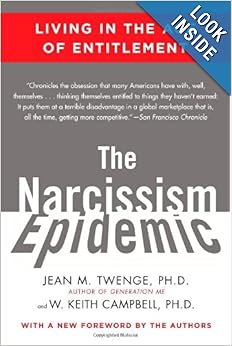The Narcissism Epidemic (2009) by Jean Twenge and W. Keith Campbell is an important book. I first heard Twenge interviewed by Michael Horton on the radio program the White Horse Inn. She presented a compelling case for the growth of narcissism and its effects upon society.
This book explores the concept of narcissism and its growth, particularly in the United States using a disease model. The book is organized into 4 sections: the diagnosis, the root causes of the epidemic, symptoms of narcissism, and prognosis and treatment.
It appears that narcissism is, in many ways, a product of the self-esteem movement gone awry. Psychological and educational programs that have attempted to foster self-esteem have sometimes gone too far, creating an environment of pandemic specialness. One of the authors young daughters made the astute observation that "if everyone is special, then no one is really special." One of the songs sung at the school of Dr Campbell's daughter went "I am special/I am special/Look at Me." In short, narcissism is a problem rooted in a sense of one's own specialness.
I particularly appreciated section 2, which dealt with root causes of the epidemic. The authors provided example after example of frankly horrifying examples of narcissism. In parenting, there is a growing emphasis on being child-centered, often relying on children to be decision makers in the family. Parents glorify their children through buying them expensive things and calling them "princesses." Even at the college level, parents are confronting faculty members and advocating for better grades for their deserving, special children. But this is problematic. The authors commented that "thinking you're great when you actually stink is a recipe for narcissism." In addition to parenting methods that foster narcissistic traits, the celebrity focused culture (think Miley Cyrus), social media (Facebook, YouTube), and the credit crisis have all contributed to our senses of being exceptional.
In the third section, they described symptoms of narcissism, which include: vanity, materialism, uniqueness, antisocial behavior, relationship troubles, and entitlement. It felt like I was reading a list of the 7 deadly sins or something akin to it.
In the final section, they provide specific recommendations for how we as a society and as individuals may respond to this crisis. For example, helping our children to develop an accurate, rather than inflated, self-image is helpful. Encouraging them to develop social interest rather than excessive self interest is essential. I particularly liked their recommendation near the end of the book to consider a Fair Tax model of taxation. I would not have made the connection to narcissism, but I think they are right.
I had just a few concerns about the book. In a few different places, they linked narcissism to global warming and environmental destruction. This seemed like a stretch to me and that they were looking for a way to bring this issue to the table. I also disagreed with some of their parenting recommendations, but that is more closely linked to my worldview and my understanding of the psychological research than anything else.
On the whole, The Narcissism Epidemic is a very important book. Not only would it be useful for helping professionals, but frankly for anyone who's interested in at least one explanation for why society has changed in the way it has. I fear what will happen if we continue down this road and continue to criticize more traditional values like humility, love, and kindness.


No comments:
Post a Comment